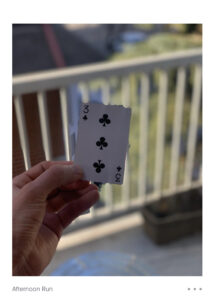I trained completely randomly for a month and this is what happened!
“This is the central illusion in life: that randomness is risky, that it is a bad thing—and that eliminating randomness is done by eliminating randomness.”
– Nassim Nicholas Taleb, Antifragile: Things That Gain From Disorder

By Garrett de Jong - April 2021
There’s no denying that the pandemic has shaken some things up. The chaos of the last year and a bit has driven us to change and nudged (or aggressively pushed 😛) us to try new things. While some people started making bread, I wanted to shake up my run training and try something new. But I wasn’t exactly sure what I wanted to do. Did I want to train for a new race distance, or try a new form of cross training? None of these things really excited me that much. I needed something even more novel.
My answer came after reading Antifragile by Nassim Nicholas Taleb. Along with some of Taleb’s other books such as Black Swan and Fooled by Randomness, his writing was extremely relevant for life during a pandemic. Nassim writes about how life is always more random than we like to think. Additionally, many of the systems we have in place are more fragile than we think (i.e. stock market crashes, infrastructure damage from natural disasters, injuries despite years of sport science research, etc.). These systems are “fooled by randomness” and as a result break down from the rare but inevitable “Black Swan” events. These theories seen through my therapist and runner lens got me thinking 🤔. What if despite all of our sport science and training theories, run training is more random than we think? One sport scientist’s perfect plan will look completely different from another’s. With so much variability and complexity in sport science how is it different from complete randomness? We naturally don’t like the answer “it’s random”. We need answers. Life feels safer that way. The unknown is uncomfortable.
What if despite all of our sport science and training theories, run training is more random than we think?
But if we disregard the effect of randomness in life we are susceptible to believe in false correlations. In effect the randomness of life can break us down if we don’t acknowledge it. My thought was “what if we embraced this randomness in my run training, rather than try to make sense of it”. How could I combat fragility and grow from randomness rather than breakdown from it? To grow from Black Swan events in training rather than breakdown from it.
In running, Black Swan events can be the cumulation of a few factors to seem like bad luck but tend to be much more common than we think. For example, new shoes, longer run, different pace, bad sleep, a little dehydrated and suddenly you step awkwardly off a step and your ankle is now swollen. They can also be those rare things we do that always seem to break us. For example, a high mileage week or barefoot running or sprinting. We can try to control all of these countless factors OR we can try to become more robust and to actually grow from this unpredictable change, to grow from randomness.
And so was born the idea to train completely randomly and see what happens! What better way to do this than use a deck of cards to determine my training. Here’s some extra information on the logistics of my training plan for the month.
- the number on the card determined the number of miles, 2= 2miles, jack = 11 miles, and aces were high so = 14 miles.
- I used 30 predetermined cards from the deck which averaged 8 miles a day, my average weekly mileage was going to be ~90k
- I had averaged 60km a week of running on top of strength and XC ski training so I wasn’t unfit heading into this.
- I flipped the cards the night before so I had some time to plan my day.
- All runs were to be ‘easy’ base mileage. No intervals or tempo runs. Maybe I’ll randomly add ‘random’ workouts next year.



I am happy to say it was a success, I grew as a runner (and as corny as this sounds I grew as a person), and feel stronger as a result. Here are my 6 takeaways from my 2021 Random Training Project.
- Run more sustainably. I never knew what card (mileage) I would flip next. As a result I needed to run with the potential that tomorrow’s run would be a long run. A motto I had was “tomorrow can always be an ace”. I needed to run sustainably. I couldn’t rely on easy days to recover. I was forced to find that sustainable pace for me. I find a lot of runners (myself included) have a hard time running their easy runs easy. Not knowing what was coming next definitely helps! Evolutionarily speaking this makes a lot of sense. Cravemen never knew what tomorrow had in store.
- Live more sustainably. This was an unexpected outcome but I think one of the most valuable lessons from the month. Since it was clear that I could not predict the distance of my upcoming runs I needed to ensure that my life could cope with the unexpected fluctuations. Life needed to be flexible enough to deal with the inevitable ups and downs. In my case the ups and downs were running mileage. Nonetheless they could have been any other random event (car breaks down, health scare, dog gets sick, Covid lockdowns etc.). I needed to ensure that my life wasn’t so rigid and fragile that it would break down by any random (Black Swan) event.
- Balance of fear and fun. Not knowing what is coming next is both scary and exciting. Because I was a tad nervous and fearful of doing back to back long runs (which happened on a few occasions!), it was easy to be proactive with my injury prevention and dietary habits. It didn’t take much willpower because I was afraid of getting injured or burnt out! I think it’s important to be a tad fearful of your training plan! Alternatively the excitement of not knowing what was coming next definitely added a fun and playful aspect to my training. That’s something that is easy to lose sometimes! Overall being curious is a great mindset to have with training (and in life!).
- Become antifragile. Rigid training plans are fragile because they don’t take into account all the potential factors that can affect the outcome. When you accept the inevitable random factors that can/will affect your training, you can make decisions to grow from randomness rather than break down from it. Growth requires changing environments aka this randomness. In my case I grew from the variety of stimuli from training randomly. In a traditional training plan that is successful there is surely a variety of stimuli (intervals, long runs, VO2 max work, whatever-you-wanna-call-it) that is essentially random stimuli.
- True training principles. After feeling pretty damn strong after training absolutely randomly for a month you come to realize which training principles matter and which ones don’t! I am reminded of this quote that “all models are wrong, but some are useful” by some smart guy 🤓. Here are the useful principles: 1. We need direction for the sake of direction. It can be a coach, it can be a deck of cards! 2. We need accountability. 3. We need consistency and novelty. Beyond this it can be argued that successful training outcomes are essentially random anyways.
- Liberating. Knowing that training is more random than we often think liberates us from stressing about the little details. Stick to the fundamentals and get really good at them.
Lastly, I think it’s important to mention that I am now working with a coach (fellow coach Lauren from Mile2Marathon!) as I train for specific ‘races’. I do believe there is a place for specific training but I am confident that my base of general random training will set me up really really well!
Thanks for reading! I would love to hear your comments and/or questions.
Ps. Check out my Strava account to see the random breakdown of my 30 days.
Garrett